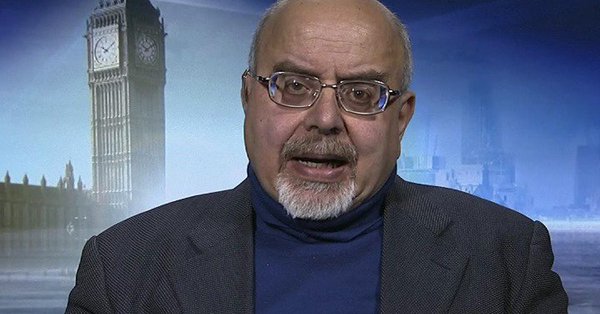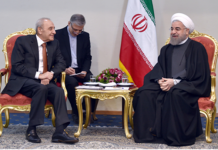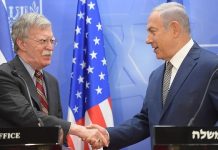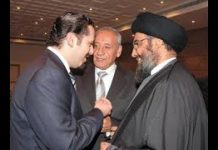Waiting for an ‘Arab Project’
Eyad Abu Shakra/Asharq Al Awsat/January 10/19
There is a disagreement regarding the next practical steps in the countdown for the Arab Economic Summit that is expected to be hosted by the Lebanese capital Beirut later this month.
In Lebanon, there are those who are trying hard to turn this Summit into the opportunity in which the Syrian regime is restored, although the Arab League is the organization entitled to send the official invitations.
This Summit actually takes place in an atmosphere of confusion and cautious expectation at various levels; as neither the already-troubled Arab states look capable of producing a clear vision for the future, nor the Arab regional alliances – as it seems – genuinely agree on how to suitably handle the serious challenges that lie ahead.
The next few months, notwithstanding the warnings of experts of an impending financial crisis that may even surpass that of 2008, does not usher any good news to the Arab world and the Middle East, especially, the states lying within the Israel-Iran-Turkey ‘triangle’. Then, if the protectionist financial policies adopted by the US administration of President Donald Trump are contributing, one way or another, to a confusion in the world’s markets, its strategic policies towards the Middle East reflect two things:
1- A solidly-based cohesive approach
2- A reliable long-term commitment
Well. A couple of days ago when the General Confederation of Lebanese Workers called for a general strike, one of its top leaders said: “We are only for a cabinet…!”
On the face of it, this is a simple and innocent demand. The least required in any state that regards itself independent is a cabinet that runs its affairs and takes responsibility of government. However, Lebanon, which is hosting the aforementioned Economic Summit, is still unable to form a cabinet although the general elections were conducted last May. Eight months have passed, and Lebanon remains without an executive authority, that works under the supervision of an elected legislature, in the midst of a frightening economic downturn, and a political vacuum that the country’s political, religious and labor leaders do not seem ready to come clean about.
In fact, to make matters worse, some of those who are attempting to suggest ‘settlements’ that would end this vacuum, are among its main culprits; since the current political set-up is underpinned on temporary interests and spiteful calculations, whereby all parties are playing for time, and waiting for a favorable change in the regional climate.
What I mean here is that there are no genuine ‘common denominators’ between the Lebanese; more so between those who claim to be ‘allies’. Simply put, the current regional situation pushes for the creation of certain temporary coalitions. These, sooner or later, would collapse the moment the regional situation changes or international approaches differ.
Given the above, the camp associated with the Christian Maronite president is keen on securing a ‘blocking third’ of the cabinet ministers through enlarging the president’s lot. This, it hopes, would also facilitate the issue of succession from within his own camp.
On the other side, there is Hezbollah, the de facto strongest player in Lebanon, although it does not constitutionally enjoy a comparable sway. Thus, it is adamant on keeping the ‘status quo’ which guarantees its real exclusive control of security and non-governmental arms; and it is doing so by:
1- Undermining from within the unity of non-Shiite religious and sectarian groups
2- Preventing the president’s camp from gaining a free hand, and benefiting from its constitutional privileges
Then, there is a third camp, which is headed by the prime minister-designate, and where the Sunnis constitute the major part of its base. This camp now finds itself a spectator in a fight between two ‘allied’ camps which in reality have nothing in common but weakening the prime minister and his Sunni base. They have been doing this through marginalizing and undermining the ‘Taif Accord’; enshrined in Lebanon’s constitution 28 years ago, since it ended the country’s 15-year civil-regional war.
What has been happening in Lebanon does not differ much from what has been taking place in Iraq. There too there is a crisis of diversity made worse by the influence of the same regional power that has aided Lebanon’s Hezbollah in achieving its ascendancy. In Iraq, Iran is also the principal player whose wishes and ambitions are carried out by the most powerful organization with the Popular Mobilization Forces (PMF) and some Tehran-linked political groups. Here too there is a crisis caused by the failure to form a complete cabinet, months after the general elections. The reason has been the disagreement on who would be given the three key cabinet portfolios; i.e. the Ministry of Interior, the Ministry of Defense, and the Ministry of Justice.
Iran and its henchmen have already succeeded in securing their Sunni candidate the post of the Parliament Speaker, which is constitutionally reserved to the Arab Sunnis. This outcome resembles Hezbollah’s insistence on securing a cabinet seat to one of six Sunni MPs close to its line, and refusing that this minister would vote with the President’s lot which would allow the latter to enjoy a ‘blocking third’ within the cabinet.
As for the Iraqi Kurds, who have been constitutionally given the office of the President, they have been effectively and temporarily neutralized, thanks to what seems like an undeclared ‘truce’ in the Iraqi arena between Washington and Tehran.
The Kurdish angle leads us to Syria. Here, Washington’s on the ground handling of the ‘Kurdish situation’ and Iran’s presence in Syria looks far from clear. Indeed, President Trump’s decisions, and the resignations of Gen. Jim Mattis, the US Secretary of Defense, and Brett McGurk (Special Presidential Envoy for the Global Coalition to Counter ISIS) make the whole picture ever more confusing and complicated. So, one hopes the visits of Secretary of State Mike Pompeo and National Security Advisor John Bolton to the Middle East may clarify the situation, at least for the region’s leaders. East of the Euphrates is inseparable from the ongoing Kurdish contacts with Bashar al-Assad’s regime. The developments, also give the impression that there are some sort of ‘arrangements’ that would involve the Turks in the north, the Iranians in central Syria, the Russians in the west, and perhaps, the Israelis in the south of what looks like a ‘New Syria’ which would, for the time being, be left under Assad’s police state institutions.
In the meantime, some moves are gathering pace aiming at ‘ending the Arab absence’ from Damascus, and ‘filling the void’ in Syria. However, such justifications run contrary to two stark truths: ending ‘Arab absence’ requires an ‘Arab project’ which so far does not exist; and the ‘vacuum’ in Syria is also a myth since the independent decision-making of Syrians has been paralyzed !
بانتظار تبلور «مشروع عربي»…
إياد أبو شقرا/الشرق الأوسط/06 كانون الثاني/19
تتضارب المعلومات، وكذلك التخمينات، عن الخطوات العملية التالية عربياً مع بدء العد التنازلي للقمة الاقتصادية العربية المنتظر أن تستضيفها، في وقت لاحق من الشهر الحالي، العاصمة اللبنانية بيروت. وثمة، في لبنان، من يسعى لأن تكون القمة مناسبة لإعادة تأهيل النظام السوري، مع أن الأمر من اختصاص جامعة الدول العربية التي هي الجهة الداعية.
الحقيقة أن هذه القمة تأتي وسط حالة من الغموض والترقّب على مختلف المستويات. فلا الدول العربية المثقلة بهمومها تبدو قادرة على إعداد تصوّر واضح للمستقبل، ولا التحالفات العربية الإقليمية – كما يظهر – متفاهمة في العمق على مقاربات إزاء تحدّيات من السذاجة التقليل من جدّيتها.
الأشهر المقبلة، ناهيك من تحسّب خبراء أسواق المال لأزمة مالية عالمية قد لا تقل خطورتها عن أزمة 2008، لا تؤشر لانفراجات على مستوى العالم العربي ومنطقة الشرق الأوسط، وبالأخصّ، الدول المطوّقة بـ«مثلث» إسرائيل وإيران وتركيا. ولئن كانت السياسات المالية، والحمائية خاصة، التي تعتمدها إدارة الرئيس الأميركي دونالد ترمب تسهم بطريقة أو بأخرى في خلق ظروف مواتية لارتباك الأسواق، فإن السياسات الاستراتيجية إزاء المنطقة لا توحي: أولاً بمقاربة متماسكة نابعة من قناعات قوية، وثانياً بالتزام طويل الأمد من الحكمة الرهان عليه.
بالأمس، عندما دعا الاتحاد العمالي العام في لبنان إلى الإضراب العام، قال أحد كبار قادته: «نحن فقط نطالب بحكومة…»!
هذا كلام في ظاهره بسيط وبريء. وصحيح أن الحد الأدنى المطلوب توافره في أي دولة تعتبر نفسها مستقلة هو أن تكون فيها حكومة تسيّر أمورها، وتتحمّل مسؤولية ما يحدث فيها. إلا أن لبنان، المرشح لاستضافة القمة الاقتصادية المشار إليها، ما زال عاجزاً عن تشكيل حكومة… مع أن «الانتخابات» المفترض بها أن تفرز سلطة تشريعية تمهّد لسلطة تنفيذية تراقبها وتتكامل معها أجريت في مطلع مايو (أيار) الماضي!
نعم ثمانية أشهر مرّت ولا حكومة تحكم ولا سلطة تحاسب، وسط قلق وتراجع اقتصادي مخيف، وفراغ سياسي ما زال القادة السياسيون والدينيون والنقابيون غير مستعدين للتصارح بشأنه.
ليس هذا فحسب، بل إن بعض الساعين لاقتراح «تسويات» للخروج من هذا الفراغ هُم أيضاً جزء أساسي من مُسبباته، لا سيما أن التركيبة السياسية الحالية إنما قامت على مصالح آنية وحسابات كيدية لتمرير مرحلة من عُمر البلد، وانتظار تبدّل مفيد في المناخ الإقليمي. والقصد، من هذا الكلام، أنه لا توجد «قواسم مشتركة» حقيقية تجمع اللبنانيين، وبخاصة، أولئك الذين يزعمون أنهم «حلفاء»… وكل ما في الأمر، أن الظروف الحالية تفرض اصطفافات معيّنة مؤقتة ستسقط، عاجلاً أو آجلاً، بمجرّد تبدّل المشهد الإقليمي أو التعاطي الدولي مع المنطقة كلها.
إزاء هذه الخلفية يسعى الطرف المحسوب على رئيس الجمهورية المسيحي الماروني إلى الحصول على «الثلث المعطل» داخل الحكومة عبر تكبير دور الرئيس، ومن ثم، تهيئة الظروف لتسهيل مسألة وراثته من داخل «تياره» السياسي.
في المقابل، هناك «حزب الله»، وهو الطرف الأقوى واقعياً، لكنه أضعف من سابقه دستورياً. وهو يريد المحافظة على «الأمر الواقع» الذي يكفل له السلطة الفعلية عبر استمرار سيطرته على الأمن والسلاح، أولاً عن طريق شرذمة الجماعات الدينية والمذهبية الأخرى من الداخل، وثانياً منع الطرف الأول – أي «تيار» رئيس الجمهورية – من تعزيز استقلاليته والاستقواء بوضعه الدستوري.
ثم هناك معسكر رئيس الوزراء المكلّف الذي يشكل السنّة الثقل الأكبر فيه، وهو الآن يجد نفسه في موقف المتفرّج أمام صراع قوّتين لم يجمعهما، ولا يجمعهما أصلاً، أي هدف… سوى إضعافه وإنهاكه عن طريق تجاوز «اتفاق الطائف»، الذي صار جزءاً من دستور البلاد منذ 28 سنة، بعدما أنهى حرباً أهلية – إقليمية طالت نحو 15 سنة!
هذا الواقع اللبناني، لا يختلف كثيراً عن الواقع العراقي. ففي العراق أيضاً أزمة تعدّدية ونفوذ ضخم للقوى ذاتها التي تعزّز قبضة «حزب الله» في لبنان.
في العراق، أيضاً، إيران لاعب أساسي تعكس رغباته وطموحاته تنظيمات نافذة داخل «الحشد الشعبي» وبعض الكتل العراقية الطهرانية الولاء. وهنا، كما نشهد منذ شهور أيضاً، تعطّل تشكيل الحكومة لدى وصول الخلاف إلى ثلاث حقائب وزارية ذات أهمية سياسية وأمنية كبرى هي الداخلية والدفاع والعدل. هذا حصل بعدما نجحت القوى المحسوبة على إيران في إيصال مرشحها السنّي المفضل لرئاسة مجلس النواب المحجوز دستورياً للسُنة العرب. وهو مشهد يشبه تحمّس «حزب الله» في لبنان لـ«توزير» واحد من ستة نواب من السُنة، ومعارضته أن يكون هذا الوزير عضواً في حصة رئيس الجمهورية حيث يضمن الأخير «الثلث المعطل»! أما المكوّن الكردي، الذي كفل له الدستور رئاسة الجمهورية العراقية، فجرى تحييده مرحلياً، وسط «هدنة» غير معلنة في المسرح العراقي بين واشنطن وطهران.
وعبر المكوّن الكردي نصل إلى الوضع السوري.
ما يُلاحظ أن التعامل الأميركي على الأرض مع الحالة الكردية والوجود الإيراني في سوريا ما زال بعيداً جداً عن الوضوح. بل إن قرارات الرئيس ترمب، واستقالة وزير الدفاع الجنرال جيمس ماتيس، ثم استقالة مسؤول ملف مكافحة «داعش» بريت ماكغورك، تزيد الصورة تعقيداً وغموضاً. ولعل الزيارتين الموعودتين لكل من وزير الخارجية مايك بومبيو ومستشار الأمن القومي للشرق الأوسط تحملان جديداً، أقله بالنسبة لقيادات المنطقة، كي تكون على بينة من القراءات والحسابات الأميركية.
وضع منطقة شرق الفرات، بشمال شرقي سوريا، لا ينفصل عن الاتصالات الكردية مع نظام بشار الأسد. والتطورات توحي بأنه لن يخرج عن «ترتيبات» معيّنة يشارك فيها الأتراك شمالاً، والإيرانيون وسطاً، والروس غرباً، وربما الإسرائيليون جنوباً، في «سوريا الجديدة» المتروكة حتى إشعار آخر في عهدة مؤسسة الأسد الأمنية. في هذه الأثناء، يتشكل توجّه نحو إنهاء حالة الغياب العربي عن دمشق وملء الفراغ في سوريا. لكن الواقع، حتى اللحظة، يشير إلى حقيقتين مؤلمتين:
الأولى أن «إنهاء الغياب العربي» يحتاج إلى «مشروع عربي» غير موجود. والثانية أنه لا وجود إطلاقا لـ«فراغ» في سوريا… بل مصادرة كاملة لقرار السوريين المستقل.






















